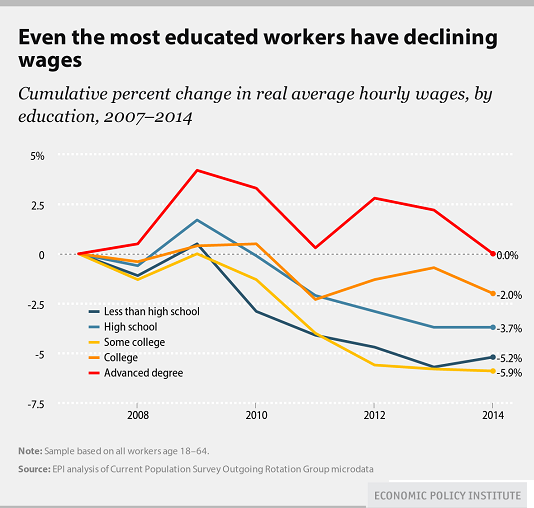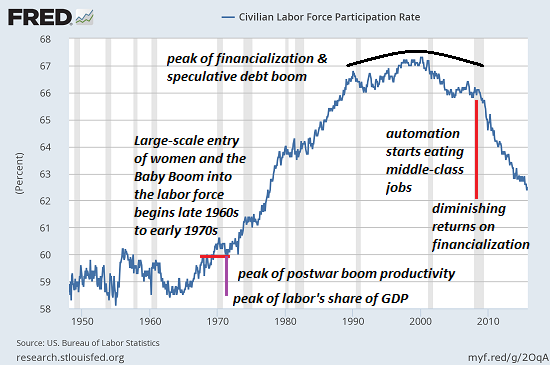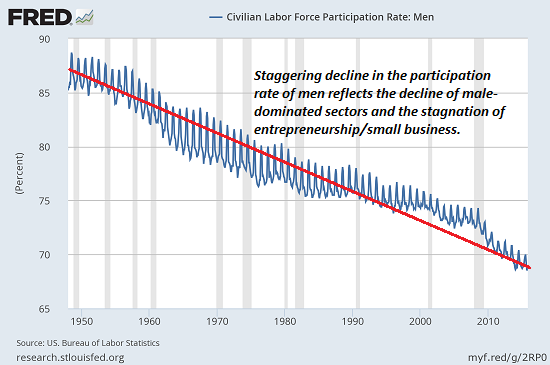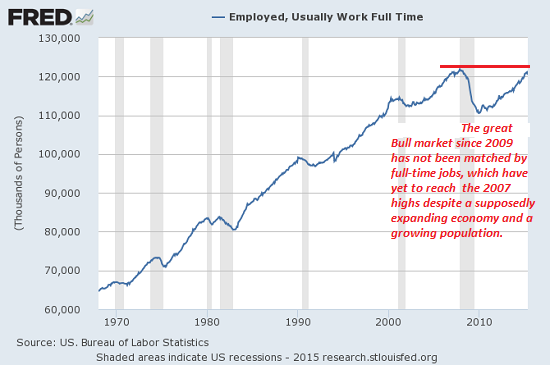Wishful thinking is not a solution.
The world of work has changed, and the rate of change is increasing. Despite the hopes of those who want to turn back the clock to the golden era of high-paying, low-skilled manufacturing jobs and an abundance of secure service-sector white collar jobs, history doesn't have a reverse gear (tm).
The world of work is never going back to the "good old days" of 1955, 1965, 1985, or 1995. Jason Burack of Wall Street for Main St. and I discuss these trends in a new podcast, Radical Changes in the Job Market, Now & in the Future (47:37).
Those hoping for history to reverse gears place their faith in these wishful-thinking fantasies:
1. That automation will create more jobs than it destroys because that's what happened in the 1st and 2nd Industrial Revolutions. The wishful thinkers expect the Digital / 3rd Industrial Revolution to follow suite, but it won't: previous technological revolutions generated tens of millions of new low-skill jobs to replace the low-skill jobs that were lost to technology.
Millions of farm laborers moved to the factory floor in the 1st Industrial Revolution, and then millions of displaced factory workers moved to sales and clerk jobs in the 2nd Industrial Revolution.
Even white-collar jobs that supposedly required a college degree could be learned in a matter of hours, days or at most weeks, and little effort was required to stay current.
The Digital/3rd Industrial Revolution is not creating tens of millions of low-skill jobs, and it never will. Even worse for the wishful thinking crowd, the 3rd Digital Revolution is eating tech jobs along with the full spectrum of service-sector jobs.
Those expecting to replace low-skill service jobs with armies of coders will be disappointed, because coding is itself being automated.
The new jobs that are being created are few in number and highly demanding. Jobs are no longer strictly traditional boss-employee; the real growth is in peer-to-peer collaboration and what I term hybrid work performed by Mobile Creatives, workers with highly developed technical/creative/social skillsets who are comfortable working with rapidly changing technologies, who enjoy constant learning and are highly adaptive.
The work that is being created in the Digital/3rd Industrial Revolution is contingent and thus insecure. The only security that is attainable in fast-changing environments is the security offered by broad-based skillsets, great adaptability, a voracious appetite for new learning and a keenly developed set of "soft skills": communication, collaboration, self-management, etc.
The problem is the number of these jobs is far smaller than the number of jobs that will be eaten by software, AI and robotics. the number of workers who can transition productively to this far more demanding and insecure work environment is also much smaller than the workforce displaced by software/robotics.
In short, we need a new system; wishful thinking isn't a solution.
2. That the U.S. can unilaterally demand the right to export its goods and services to others at full price while refusing to accept competing imports. In effect, the fantasy is to return to 1955, when the U.S. could export goods at full pop to the allies who were rebuilding their war-shattered economies. Imports were few because those economies were busy focusing on their own domestic needs.
Trade is a two-way street. Fair trade is a moving target, depending on which side of the trade you happen to be on. Everybody wants to export their surplus at top prices, but competition lowers prices and profits. This forces global corporations to seek cost advantages by lowering the cost of components and labor.
3. The wishful thinkers want strong corporate profits to prop up their stock market and pension funds, but they don't want corporations to do what is necessary to reap strong profits, i.e. move production of commoditized goods and services overseas or replace human labor with cheaper automation.
You can't have it both ways.
Wishful thinkers choose to ignore the reality that roughly half of all U.S. based global corporate sales and profits are reaped overseas. It makes zero financial sense to pay a U.S. worker $20/hour, and pay the insanely expensive costs of sickcare/"healthcare" in the U.S. when the work can be done closer to the actual markets for the goods and services at a fraction of the cost.
Memo to all the armchair wishful thinkers: if you want to compete globally with a high-cost U.S. work force and no automation, be my guest. Put your own money and time at risk and go make it happen. Go hire people at top dollar and provide full benefits, and then go out and make big profits in the global marketplace.
The armchair pundits and ivory tower academics would quickly lose their shirts and come back broke. That's why they wouldn't dare risk their own security, capital and time doing what they demand of others.
4. The wishful thinkers decry the lack of "good-paying" jobs yet they refuse to look at the reasons why employing people in the traditional boss/employee hierarchy no longer makes sense. The armchair pundits and ivory tower academics have never hired even one person with their own money. These protected privileged are living in a fantasy-world of academia, think tanks and foundations, where workers are paid with state money, grants, venture capital, etc.
As I have often noted here, Immanuel Wallerstein listed the systemic reasons why labor overhead costs will continue to rise even as wages stagnate. This means employers see total labor costs rising even if wages go nowhere: it gets more and more expensive to hire workers.
Why I Will Never Hire Anyone, Even at $1/Hour (November 10, 2015)
Then there's the staggering burden of liability in a litigious society, the costs of training and supervising ill-prepared employees and the hard-to-calculate costs of increasingly complex regulations.
5. We can solve the decline of the traditional work model with more education.This is also wishful thinking, as not only is higher education failing to produce workers with the requisite range of skills, the emphasis on higher education has produced an over-supply of people with college diplomas.
The Nearly Free University and the Emerging Economy: The Revolution in Higher Education. In the real world, even wages of the most highly educated are stagnating.
In the real world, even wages of the most highly educated are stagnating.

The structural changes in the world of work are visible in these charts: The civilian participation rate is plummeting, despite the "recovery:" 
The civilian participation rate for men is in a multi-decade decline:

Part-time jobs do not provide enough income to have an independent household or raise a family, nor do they pay enough taxes to fund the Savior State. The only jobs that count are full-time jobs, and they haven't even returned to 2007 levels despite a higher GDP and a rising population.

As a percentage of GDP, wages have been declining for decades.

Self-employment is the wellspring of entrepreneurs and small business. As you can see, it has also been declining for decades. 
It's time to get real, people. Wishful thinking is not a solution. We need a new system for creating paid work and money, and here's my proposed alternative system: A Radically Beneficial World: Automation, Technology and Creating Jobs for All. Wall Street for Main St. podcast (47:37): Radical Changes in Jobs Market Now & in Future
